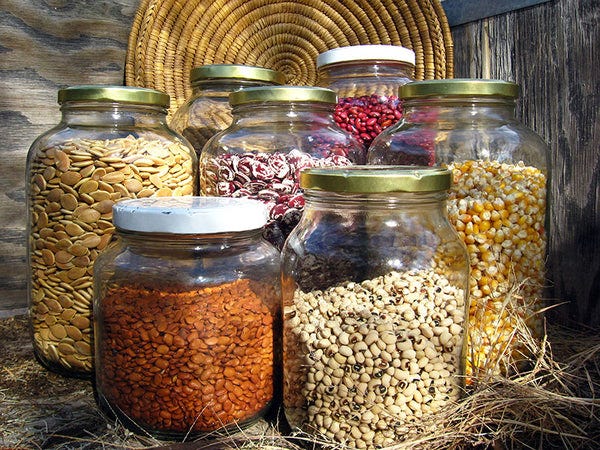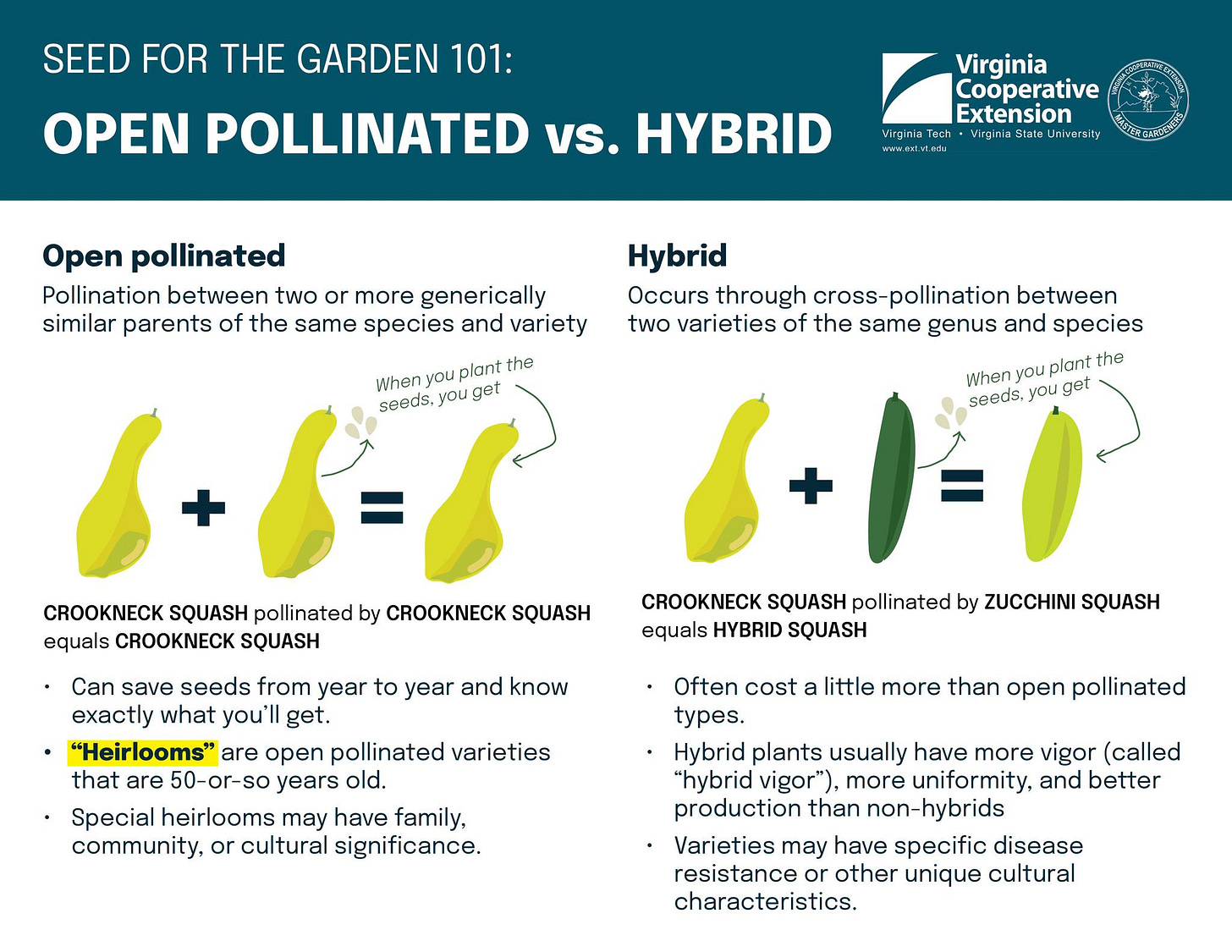Part 5: Learning to Save Seeds
A recap of the best resources I've found so far. (Seeds are pretty magical, btw.)
The arugula I planted in March this year was thriving in May and June, but when the hot temps of July arrived, it started to bolt (go to seed). Instead of pulling it out, I decided to let it do its thing so I could harvest seeds. I’m so glad I did—a single arugula plant produced more than 400 seeds! I replanted a portion of them and now the second generation of arugula is growing.
This got me started on seed collecting, and I’ve gathered seeds from about 15 different flowers and veggies in my garden. I’m a little obsessed to be honest, and eager to learn more about the science and tech of seed preservation. Turns out there are a ton of great resources available. Here’s a recap of what I’ve found.
Books
I’m starting w/ books because in a SHTF situation, a physical book will be the most reliable resource.
Highly recommended: The Seed Garden by Lee Buttala and Shanyn Siegel, published by the good folks at Seed Savers Exchange. Has full color photos and specifics on how and when to harvest seeds for different types of plants, as well as how to clean and store the seeds.
Other frequently recommended books:
The Complete Guide to Saving Seeds: 322 Vegetables, Herbs, Fruits, Flowers, Trees, and Shrubs by Robert E. Gough and Cheryl Moore-Gough. Looks like a good one! This will probably be my next seed book purchase.
Breed Your Own Vegetable Varieties: The Gardener's and Farmer's Guide to Plant Breeding and Seed Saving by Carol Deppe.
Seed to Seed by Suzanne Ashworth. Considered a classic. Lots of great info, but more text-based with a few black & white photos.
Courses
1. Seed School 101
Cost: $40. Offered by Seeds in Common. Self-paced online modules.
Topics covered include:
Seed Biology & Structure
Pollination & Breeding Systems
Seed Selection & Genetics
Wild Seeds
Harvesting, Cleaning & Storing
Seed Industry History and Patenting
Seed Enterprises
Dispelling the Myths of Seed Saving
(Note: there’s also a Grain School 101 version.)
This course gets a special mention because of its history: Seed School was founded in 2010 by husband and wife Bill McDorman and Belle Starr. The week-long training was originally offered in the western mountain states in the US, but soon they were teaching nationwide and internationally. Here’s a brief video.
Bill and Belle, along with John Caccia, also founded the Rocky Mountain Seed Alliance (RMSA): “Over the six years we were lucky enough to be involved in the establishment of more than 3,000 members, 82 Seed Libraries, 385 Seed Stewards, 95 Seed Teachers and 195 Heritage Grain Trialists known collectively as the Rocky Mountain Seed Alliance…”
True legends in the field!
2. Never Buy Seeds Again: Seed Saving for Health, Vitality and Self-Reliance
Cost: $29. Offered by Urban Farm. Consists of seven 1-1.5 hour online sessions. Self-paced. Supported by monthly live Q&A. Also includes access to past Q&A sessions and other resources.
Topics covered:
Module 1 - The Spirit, Magic & Power of Seeds
Module 2 - The History & Structure of the Modern Seed Industry
Module 3 - Intro to Mendel's Genetics & Selection and Evaluation
Module 4 - Pollination & Breeding
Module 5 - Harvest, Storage & Germination Testing
Module 6 - Wild Seed - Terms, Collection Rules & Collection Techniques
Module 7 - Seed Enterprises - Seed Exchanges, Seed Libraries & Small Seed Businesses
3. Saving Our Seeds, Saving Ourselves
Free! Offered by Fruition Seeds. Self-paced online modules.
Topics covered include:
Fun Seed Facts!
Garden Planning for Seedkeepers
Allium: Onion, Leek, Scallion & Friends
Apiacea: Carrots to Dill and Beyond
Brassicaea: Arugula, Broccoli, Cabbage & Beyond
Chenopodacea: Beets & Chard
Cucurbits: Squash, Melon & Cucumbers
Flowers!
Grains
Herbs
Legumes: Beans & Peas
Lettuce
Solanacea/Nightshades: Tomatoes, Peppers, Eggplant, Tomatillos & Friends
Wild Crafting
Cleaning Seeds
Storing Seeds
4. Seed School
Free! Offered by Freed Seed Federation and The Westport Grange #181. Takes place each year in Jan/Feb. Seven weeks, fine to drop in on specific sessions. Offered both online via zoom and in-person in Westport, Massachusetts.
Topics covered:
Background on the importance of seed saving / basic terminology
Fabaceae - beans and peas / Asteraceae - lettuce and chicories
Solanaceae - tomatoes, peppers, eggplant
Cucurbitaceae - squash, melons, watermelons, and cucumbers
Apiaceae - carrots, celery & celeriac, parsnips, and other assorted umbels / Amaranthaceae - beets, chard, spinach
Poaceae - corn, grains / Alliaceae - onions, shallots, leeks
Brassicaceae - kale, collards, cabbage, turnips, and as many other brassicas as possible
5. Virtual Seed School
Cost: $100. Offered by Seed Savers Exchange. Six-week course with online sessions offered annually in the fall. 2025 Seed School Dates: Mondays, September 29-November 3, 2025.
Topics covered include:
The Botany of Seed Saving
Harvesting and Cleaning Seeds: Dry Processing
Harvesting and Cleaning Seeds: Wet Processing
Seed Quality and Storage
Growing and Saving Seed in Your Region
Next Steps: Connecting to Community
YouTube channels
My favorite channel so far:
Budget Gardening with Vita Loca: Vita has a great playlist on how to harvest seeds from 60+ different flower, herb, and vegetable plants. She shows how to harvest them from the live plants as well as how to identify the actual seeds. (Can be tricky for certain plants!)
Will add more channels as I come across good ones.
Other useful info
It’s helpful to know difference between open pollinated and hybrid plants:
Seeds from open pollinated plants will usually regrow into the same plant as their parent. Seeds from hybrid plants may revert back to characteristics of one or the other ancestor plants.
Seed longevity charts: Guides showing how long different seed types remain capable of germinating into healthy plants when properly stored.
Optimal conditions
Temp: steady storage at ~40 degrees (F) / ~5 degrees (C)
Light: minimal light is best
Humidity: ideally below 60%
Tips:
Make sure seeds are completely dry prior to storage!
Seeds stored in fridge/freezer should be allowed to reach room temperature before a sealed package is opened. This prevents the seeds from absorbing moisture from the atmosphere as they warm up.
Tools & supplies for getting started
Seed storage envelopes
There are a bunch of options on Amazon and Etsy.
I like these PFAS-free resealable sandwich bags (my plan is to put them in mason jars w/ oxygen absorbers for longer term storage)
Mylar bags are also an option
Seed sifting screens
Spiffy set from Strictly Medicinal Seeds - runs $395
Mesh bags for capturing seeds
I’ve used unbleached cheesecloth bags and they seem to work ok.
Earthwise mesh bags are bpa free. You can also buy a case of 150 directly from Earthwise.
Regular organza bags are also an option, but I don’t love that they’re made from synthetic materials.
Oxygen absorbers and food-safe dessicant packs
My go-to for both is PackFresh USA
Important Note about Cross-Pollination Within Plant Families
When growing plants from the same family near each other, be aware of cross-pollination risks.
If these plants are close enough for bees and butterflies to transfer pollen between different plant types, the resulting seeds may end up being sterile, or produce plants different from their parent plants.
To mitigate this risk, professional/commercial seed farmers find ways to isolate specific crops to reduce the likelihood of cross-pollination. Here’s a guide developed by Seed Savers Exchange that lists the recommended distances for crop isolation.
For more info on crop families, check out these resources from communityseednetwork.org. (Also, as you may have noticed, a couple of the courses mentioned above are organized by plant family.)
Bonus info
Want to get more involved in seed preservation? Here are a few ideas…
Join or start a community seed bank
Attend or organize a seed swap event
Organize a community seed garden
These three resources were developed as part of the Community Seed Resource Program, a project of Seed Savers Exchange and Seed Matters.
Seed Saving Laws
They do exist, but they primarily apply to commercial farmers. More on that here, courtesy of the Gardenerd youtube channel.
And finally, if a video on all of the above would be helpful, here’s a good one to start with, courtesy of the FarmFolk CityFolk youtube channel.
—
Previously on The Thoughtful Prepper...













